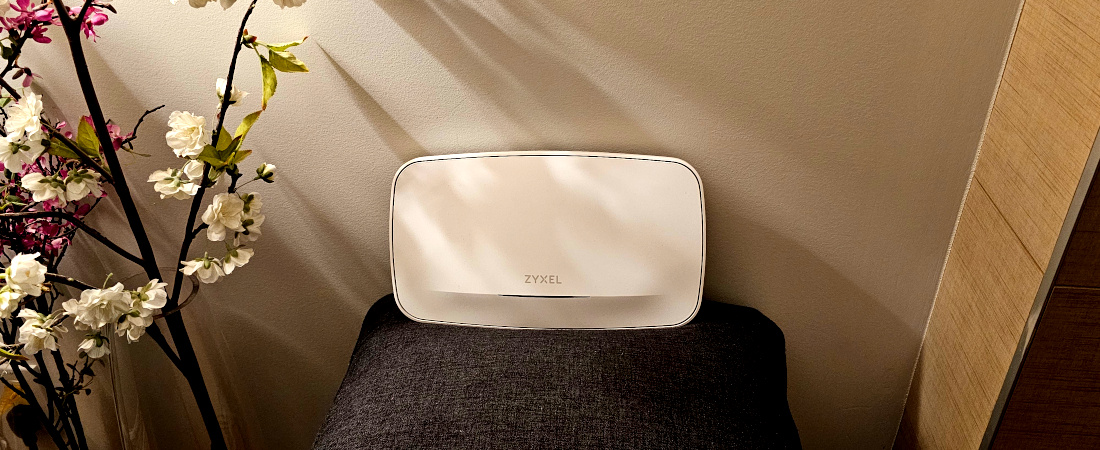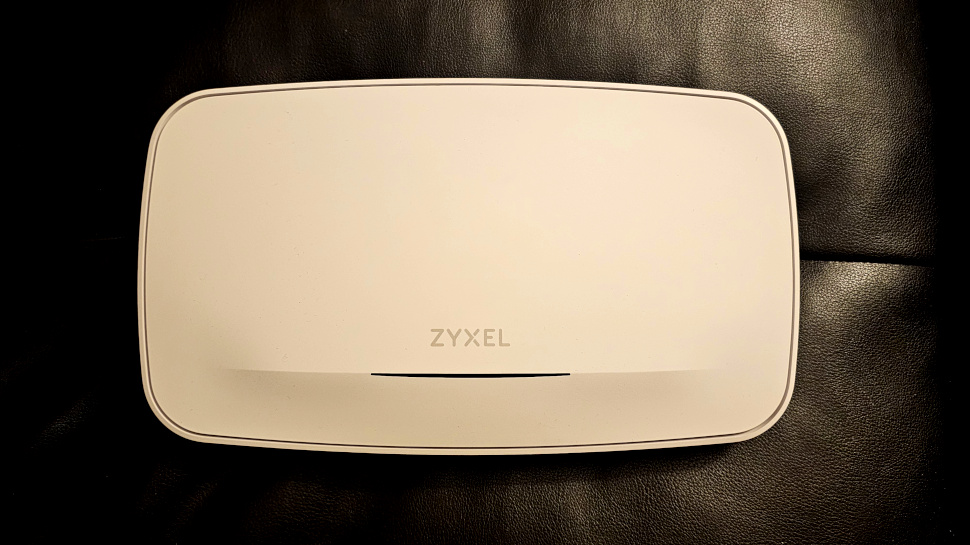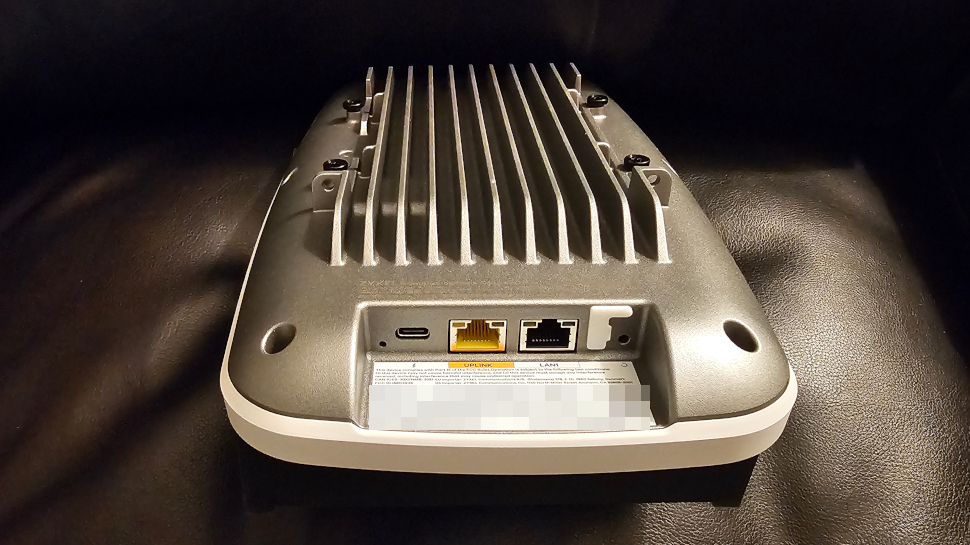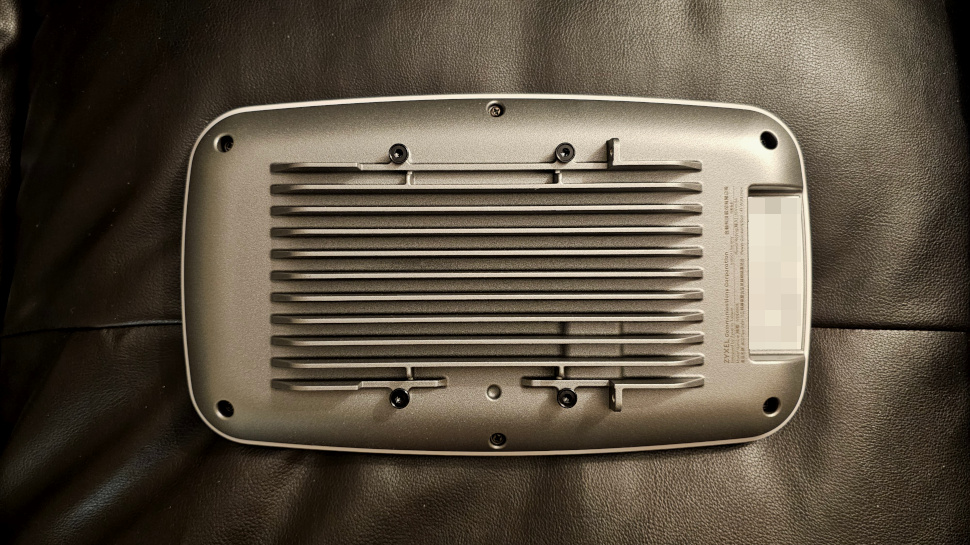
Zyxel’s new WBE660S Wi-Fi 7 access point quickly and reliably brings fiber-like transfer rates to wireless devices in only a few steps. With an aggregated bandwidth of over 22 Gbps, the AP is no longer the bottleneck around the office. The three-radio system, each with four streams, increases utilization by providing a dedicated backhaul channel in a mesh configuration.
Wi-Fi 7 technology increases power consumption. The higher frequency means more energy is wasted as heat, which helps explain the sizable heatsink at the back of the AP. In fact, with its 1.4kg, it is one of the heaviest units we’ve seen at TechRadar Pro. The mobile app makes integration into Zyxel’s cloud infrastructure straightforward. The AP supports up to 8 SSIDs with over one thousand simultaneous clients.
Since the Wi-Fi 7 standard has been out for less than a year, expect the price to be much higher than Wi-Fi 6 or 6e access points. The WBE660S is four times as fast as previous generations, justifying the hefty price tag of $799, which also carries a two-year warranty. The WBE660S is on special right now on Amazon for $499.

Zyxel WBE660S: Testing
To thoroughly test the WBE660S access point, we used a BE200 Wi-Fi 7 WLAN card to exercise the new 6GHz channel in both directions. An Iperf Linux server connected to the AP through the 10Gb interface tested clients' throughput at one meter.
Zyxel WBE660S: Design
Right out of the box, the Zyxel WBE660S Wi-Fi 7 access point shows many differences from the previous generation. The white oblong-shaped unit has a gray metal back, which doubles as a heatsink. It is twice as wide as the previous Zyxel Wi-Fi 6e model, measuring 31 cm x 17.8 cm x 5.6 cm and weighing 1.4kg. The mounting kit includes a backplate that secures the AP to a wall or ceiling. Another difference from previous APs is that the Wi-Fi 7 model can quickly dismount from the backplate by rotating a blue locking knob.
Model: Zyxel WBE660S
CPU: Quad-core Qualcomm 1220 CPU
RAM: 2GB
Storage: 256MB NAND
Radios: One 4x4 for 6GHz Wi-Fi 7 / 6e, One 4x4 for 5GHz Wi-Fi 6, One 4x4 for 2.4GHz
Wireless throughput: Theoretical 22Gbps
Ports: 10Gb Ethernet with PoE, 1Gb Ethernet
Weight: 1.4 kg
Dimensions: 31 cm x 17.8 cm x 5.6 cm
Power Consumption: 17W with one client connected; 41W maximum consumption
The WBE660S utilizes three radios, offering an aggregated bandwidth of 22 Gbps. In addition to the regular 2.4GHz and 5GHz bands, the new 6GHz frequency allows 11.5Gbps in optimal conditions by using a channel bandwidth of 320MHz, twice what is available in Wi-Fi 6 and 6e. A 10G Ethernet port supplies power over PoE and the necessary bandwidth to drive such a high data rate. Zyxel offers a secondary 1G Ethernet port on the access point, which can turn the AP into a rudimentary 10G/1G switch.
A single multicolored LED on top of the case provides information about the AP’s operation. Full green means clients are connected, while blue indicates that the AP is boot-up. The built-in antenna offers a maximum of 5dBi of gain, which, together with -104dBm of RX sensitivity, translates into a speedy connection even when located far from the access point. Connected devices can reach throughputs of 500Mb/s at ten meters or more.
The WBE660S features a Qualcomm Pro 1220 chip, which includes a quad-core A73 CPU clocked at 2.2GHz. The platform offers up to 12 spatial streams to sustain the 22 Gbps bandwidth. Coupled with 2GB of DRAM and 256MB of storage, the IPQ9574 CPU can easily accommodate over one thousand clients connected to eight SSIDs. The enclosure, which serves as a heatsink, becomes warm over time, reaching a peak of 50 degrees Celsius.

Zyxel WBE660S: In Use
The easiest way to power the WBE660S is through the Uplink port, which provides up to 45W using PoE. Even without a power injector or switch supporting PoE, the device can still be powered through the built-in Type-C connector, requiring 12V at 45W. The AP boots in less than two minutes when connected to a 10G Ethernet port. The front LED slowly blinks green if everything goes well, indicating that clients can connect. With one client connected, the AP consumed only 17W.
Unlike the previous WBE from Zyxel, the new Wi-Fi 7 model is surprisingly more tolerant of regular Ethernet cabling, even at 10G. We had no linkup issue using a five-meter Cat-5 cable connected to a Zyxel 10G switch. The unit does not provide any visual means of knowing the Ethernet speed, so we used the Nebula portal to see if the connection was optimal.
Configuration can be done using Zyxel’s mobile application by scanning a QR code on the back of the unit. Adding the access point to the app is recommended before performing the hardware installation. The Nebula portal allows users to configure and update other Zyxel network devices besides the WBE660S.

Zyxel WBE660S: Performance
The yet-to-be-ratified Wi-Fi 7 standard improves on the 6th edition by having higher throughput per channel and more channels in the 6GHz band. This results in an upper limit of 46 Gbps, more than four times Wi-Fi 6 aggregated bandwidth. We validate the performance of the WBE660S with a BE200 module, supporting a maximum speed of 5Gbps provided by two streams. At one meter, the maximum throughput was 2.5Gbps downstream and 3.7Gbps upstream. Latency is 1 ms with a jitter of 0.1 ms.
Zyxel WBE660S: The competition
The Ubiquity U7 Pro access point offers Wi-Fi 7 connectivity on a budget. At $239, it is one of the cheapest APs available. However, if one invests in Wi-Fi 7 technology, one will likely favor throughput over monetary savings. The U7 Pro has six spatial streams compared to the twelve offered on the WBE660S, resulting in half the throughput. The Ethernet connection is also slower at 2.5Gbps instead of 10Gbps.
Zyxel WBE660S: Final verdict
The WBE660S lives up to the expectations brought by the arrival of Wi-Fi 7. With three radio channels, the unit supports legacy standards such as Wi-Fi 2.4G and 5ac. The 6GHz radio sets it apart with four simultaneous streams, each having a higher bandwidth than Wi-Fi 6. The access point does not suffer from range loss since it covers over 1000 square feet with throughput degradation similar to previous generations. Using the WBE600S is straightforward, thanks to its flawless integration into the Nebula ecosystem.
Having an extra channel with higher bandwidth comes with its challenges. The WBE600S uses much power, about twice as much as previous generations. As a result, the metal case is much bigger and heavier. The higher power will also hurt the wallet and increase the electricity bill. This access point remains an excellent tool for applications requiring high bandwidth, such as augmented reality and 8K videos.
We've also listed the best UPS (Uninterruptible Power Supply).







